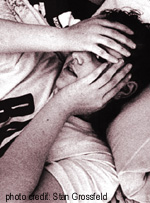|
|
|
Controversial
Topics
POINTS
THAT MAY SPARK CONTROVERSY/DEBATE:
You may run into individuals who feel threatened by the film, become defensive.
Their concerns are often:
What about false accusations?
What about the responsibility of the woman?
What about the "gray area" surrounding consent?
It is a major trap in a discussion to get hung up on the myth that women,
for any number of reasons, often "cry rape". Dealing with the notion of
false accusations is fairly straightforward because, according to the
FBI, there are no more false accusations of rape than there are false
accusations of any other crime. The actual figure is somewhere between
2 and 3%. When they do occur, false accusations hurt all of us, especially
the real victims of this crime who have to face disbelief. The vast majority
of rapes are not reported and the tendency of the media is to draw focus
to the exceptions, to the rare instances of false accusations, and with
a focus on the "devastating effect" on the accused.
From a feminist perspective, the reason people are focused on the woman's
responsibility is because it lets sexual coercers off the hook for their
predatory behavior. If you can blame the victim, you don't have to take
responsibility for your own actions. It is best to steer conversations
away from this pitfall. Instead, ask, "How does this fit into the larger
picture?" Part of the effort of this film is to look at the larger picture
of rape, outside of the "he said, she said" debate. What does it mean
that we try to hold the victim responsible for her rape? Does this mean
we believe that women can't wear tank tops and short skirts? Does this
mean we are saying women can't go out at night? Are we saying that anyone
who goes to a bar and meets someone gets what he or she deserves? Are
we saying that we don't have the right to drink and be safe from sexual
assault and rape? Are we saying that being drunk is a form of consent?
CONSENT is another huge area of controversy. What does "consent"
mean? Remember Salamishah's story from the film. At a certain point she
stopped saying "no." Why would some people interpret this as consent?
What does that attitude suggest/indicate?
People project a great deal of fear into the consent debate. If you don't
blame the victim it leaves men vulnerable to the criminal justice system
and other sanction -- the alternative to blaming the victim is making
a criminal out of the man. How does blaming the victim maintain the balance
of power in social relations?
Antioch College developed a very thorough consent protocol to stop date
rape. It requires that the person initiating sexual contact receive affirmative
verbal consent at each level of intimacy:
http://www.antioch-college.edu/survival/html/sopp.html
This policy generated significant media ridicule. Why do you think there
was so much negative reaction to this policy? Would you participate in
a similar dialogue? Why or why not? What are important components of a
campus sexual assault policy?
OTHER DISCUSSION TOPICS:
Beginning
the Discussion
Human
Rights
Prostitution
and the Sex Trade
Rape
in Prison
Dating
Violence
Child Sexual Abuse
Pornography
Legal
Issues
|
|

Teens
16 to 19 are three
and one-half times more
likely than the general population to be victims of rape, attempted rape
or sexual assault.
Source: National Crime
Victimization Survey.
Bureau of Justice Statistics, U.S. Department of Justice, 1996.
|


